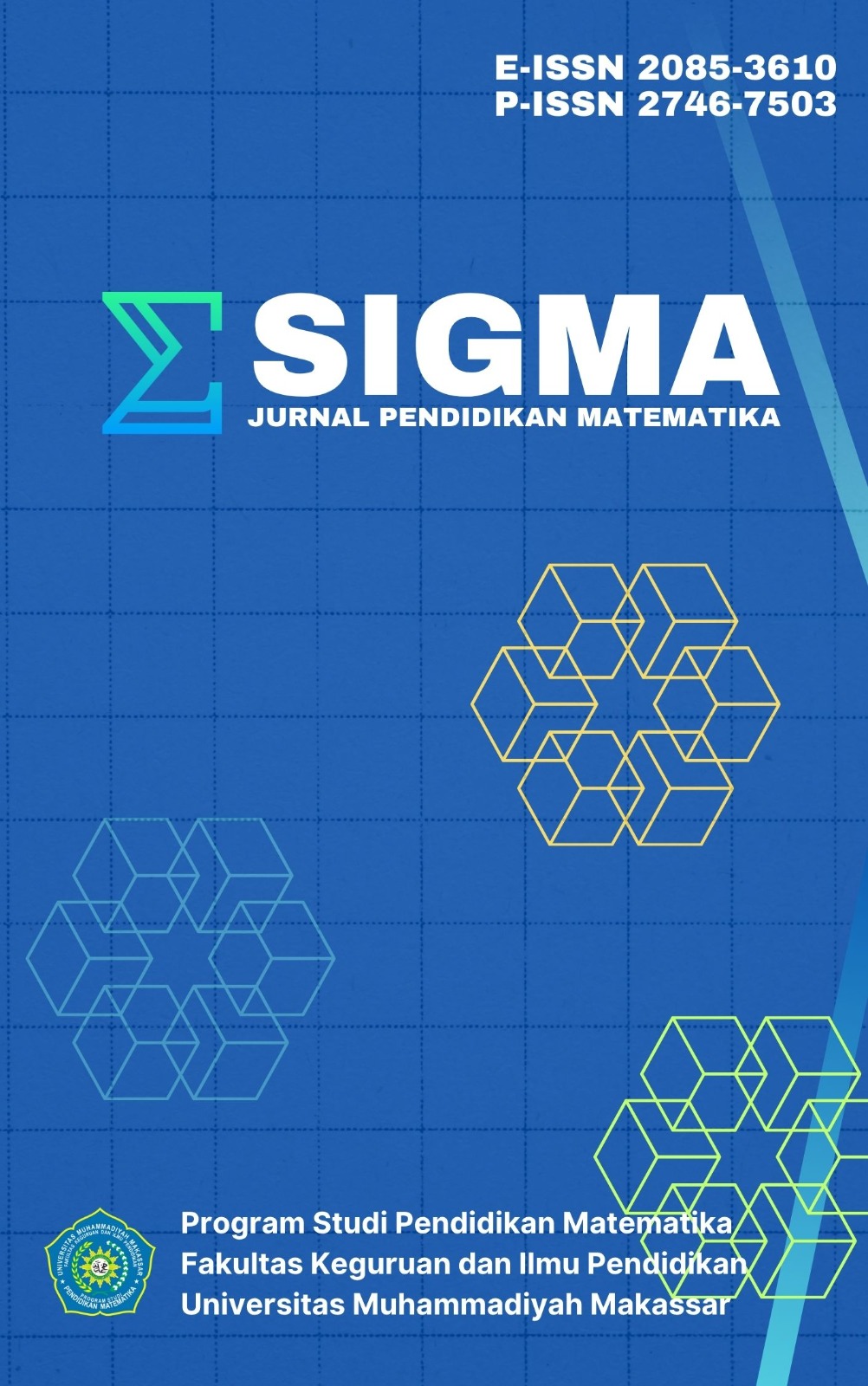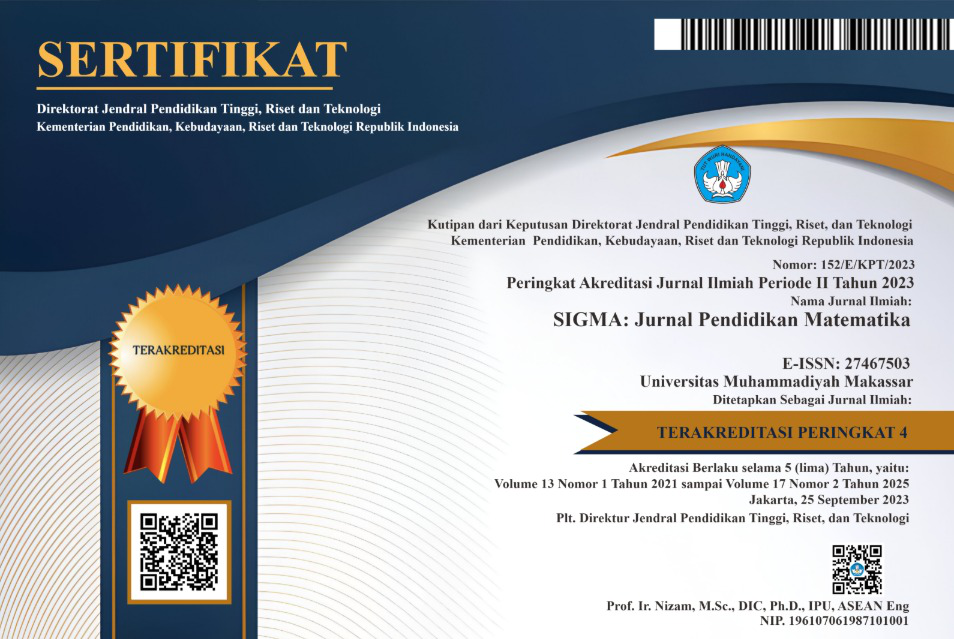LITERASI TEKNOLOGI DAN KAITANNYA DENGAN LITERASI MATEMATIKA: TINJAUAN SISTEMATIS BERBASIS PRISMA
DOI:
https://doi.org/10.26618/xt09rb83Keywords:
literasi matematika, systematic literature review, PRISMA, literasi teknologiAbstract
Penelitian ini merupakan tinjauan sistematis (Systematic Literature Review/SLR) yang mengkaji hubungan antara literasi teknologi (technology literacy) dan literasi matematika dalam konteks pendidikan formal. Kajian dilakukan dengan mengikuti pedoman PRISMA 2020 melalui pencarian pada berbagai basis data terindeks, yaitu Scopus, Web of Science, ERIC, Springer Link, Taylor & Francis, serta Google Scholar hingga 11 September 2025. Proses seleksi dengan kriteria inklusi dan eksklusi menghasilkan temuan awal 1.842 artikel, pada duplikasi sebanyak 1.210 artikel tersisa. Selanjutnya, proses screening diperoleh 935 dan pada tahap full-text assessment 84 artikel. Akhirnya, setelah penerapan kriteria inklusi dan eksklusi yang ketat, diperoleh 18 artikel yang memenuhi syarat untuk dianalisis lebih mendalam terdiri atas 12 studi empiris dan 6 kajian teoretis. Hasil analisis menunjukkan bahwa literasi teknologi memiliki kontribusi penting dalam pengembangan literasi matematika. Penerapan teknologi dapat memperkuat pemahaman konsep melalui visualisasi dinamis, menyediakan akses terhadap sumber belajar adaptif, meningkatkan motivasi belajar, serta mendorong keterampilan pemecahan masalah siswa. Namun, efektivitas penerapan literasi teknologi tidak bersifat universal, melainkan dipengaruhi oleh sejumlah faktor, seperti kompetensi guru, desain instruksional yang digunakan, serta ketersediaan infrastruktur pendukung di sekolah. Berdasarkan temuan tersebut, penelitian ini merekomendasikan perlunya kajian lanjutan yang menelaah integrasi literasi teknologi dan literasi matematika secara lebih mendalam, khususnya dengan pendekatan kuasi-eksperimen dan longitudinal. Selain itu, implikasi kebijakan menekankan pentingnya penguatan pelatihan guru, pengembangan kurikulum berbasis literasi digital, serta penyediaan fasilitas teknologi yang memadai di berbagai jenjang pendidikan.
References
Aini, V., Hidayat, T., Kusnadi, K., Williams, C., & Hadibarata, T. (2024). Analysis Numeracy Literacy Skills of High School Students in Biodiversity Material Based on Minimum Competency Assessment Questions. Jurnal Pendidikan IPA Indonesia, 13(1), 128–136. https://doi.org/10.15294/jpii.v13i1.49265
Baber, H., Fanea-Ivanovici, M., Lee, Y. T., & Tinmaz, H. (2022). A bibliometric analysis of digital literacy research and emerging themes pre-during COVID-19 pandemic. Information and Learning Science, 123(3–4), 214–232. https://doi.org/10.1108/ILS-10-2021-0090
Blau, I., Shamir-Inbal, T., & Avdiel, O. (2020). How does the pedagogical design of a technology-enhanced collaborative academic course promote digital literacies, self-regulation, and perceived learning of students? Internet and Higher Education, 45. https://doi.org/10.1016/J.IHEDUC.2019.100722
Calvani, A., Cartelli, A., Fini, A., & Ranieri, M. (2008). Models and Instruments for assessing Digital Competence at School. Journal of E-Learning and Knowledge Society, 4(3), 183–193. https://doi.org/10.20368/1971-8829/288
Chen, X., Zhou, J., Wang, J., Wang, D., Liu, J., Shi, D., Yang, D., & Pan, Q. (2022). Visualizing Status, Hotspots, and Future Trends in Mathematical Literacy Research via Knowledge Graph. Sustainability (Switzerland), 14(21). https://doi.org/10.3390/SU142113842
DeLuca, C., LaPointe-McEwan, D., & Luhanga, U. (2016). Approaches to Classroom Assessment Inventory: A New Instrument to Support Teacher Assessment Literacy. Educational Assessment, 21(4), 248–266. https://doi.org/10.1080/10627197.2016.1236677
Djulia, E., Restuati, M., Sihotang, R., Sianturi, R. L. P., Hutagaol, M. M., & Syabrina, J. (2022). Junior High School Student’s Literacy of Science Concept: Electricity & Heredity. Journal of Education, Teaching and Social Studies, 4(1), p63. https://doi.org/10.22158/jetss.v4n1p63
Gadanidis, G., Li, L., & Tan, J. (2024). Mathematics & Artificial Intelligence: Intersections and Educational Implications. Journal of Digital Life and Learning, 4(1), 1–24. https://doi.org/10.51357/jdll.v4i1.249
Guthrie, J. T., Wigfield, A., & VonSecker, C. (2000). Effects of integrated instruction on motivation and strategy use in reading. Journal of Educational Psychology, 92(2), 331–341. https://doi.org/10.1037/0022-0663.92.2.331
Hadi, S., Retnawati, H., Munadi, S., Apino, E., & Wulandari, N. F. (2018). The difficulties of high school students in solving higher-order thinking skills problems. Problems of Education in the 21st Century, 76(4), 520–532. https://doi.org/10.33225/pec/18.76.520
Haleem, A., Javaid, M., Qadri, M. A., & Suman, R. (2022). Understanding the role of digital technologies in education: A review. Sustainable Operations and Computers, 3, 275–285. https://doi.org/10.1016/J.SUSOC.2022.05.004
Harahap, M. S., Nasution, F. H., & Nasution, N. F. (2021). Efektivitas Pendekatan Pembelajaran Science Technology Engineering Art Mathematic (Steam) Terhadap Kemampuan Komunikasi Matematis. AKSIOMA: Jurnal Program Studi Pendidikan Matematika, 10(2), 1053. https://doi.org/10.24127/ajpm.v10i2.3633
Harahap, M. S., & Nasution, S. R. A. (2019). Penerapan Flipped Classrom Berbasis Youtube Di Prodi Matematika Untuk Meningkatkan Kemampuan Pemecahan Masalah Mahasiswa. Jurnal Education and Development, 7(3), 1. https://doi.org/10.37081/ed.v7i3.1023
Jamaan, E. Z., & Yerizon, Y. (2023). Enhancing teacher creativity in digitalizing math-literacy modules through technological pedagogical content knowledge training. Al-Jabar : Jurnal Pendidikan Matematika, 14(1), 141–151. https://doi.org/10.24042/AJPM.V14I1.16832
Kaplar, M., Radović, S., Veljković, K., Simić-Muller, K., & Marić, M. (2022). The Influence of Interactive Learning Materials on Solving Tasks That Require Different Types of Mathematical Reasoning. International Journal of Science and Mathematics Education, 20(2), 411–433. https://doi.org/10.1007/s10763-021-10151-8
Kemdikbud. (2023). Rapor Pendidikan Indonesia Tahun 2023. In Merdeka Belajar. https://raporpendidikan.kemdikbud.go.id/login
Kusumastuti, F. A., Lutfi, M. K., & Junaedi, Y. (2025). Analisis Literasi Matematis Siswa dalam Pembelajaran Berbasis TPACK Berbantuan Media E-learning. Wilangan: Jurnal Inovasi Dan Riset Pendidikan Matematika, 6(1), 53. https://doi.org/10.62870/WJIRPM.V6I1.31848
Lestari, E. P., Wasis, W., & Purnomo, T. (2022). Science Learning Materials in Integrated PBL Scientific Literacy Model to Improve Problem Solving Ability of Junior High School Students. IJORER : International Journal of Recent Educational Research, 3(4), 464–477. https://doi.org/10.46245/ijorer.v3i4.230
Lestari, Y. (2015). Dampak Teknologi Informasi Terhadap Pembentukan Karakter Bangsa. Seminar Nasional, Pembangunan Karakter Melalui Pendidikan Dan Pembelajaran, 1–7. https://www.journal.unbara.ac.id/index.php/prosiding/article/download/80/67
Masamoto, M., Stevens, C., & Ettinger, L. (2024). Changes in high school students attitudes toward health sciences following a hands-on outreach STEM program. Anatomical Sciences Education. https://doi.org/10.1002/ase.2494
Muhaimin, L. H., Sholikhakh, R. A., Yulianti, S., Ardani, Hendriyanto, A., & Sahara, S. (2024). Unlocking the secrets of students’ mathematical literacy to solve mathematical problems: A systematic literature review. Eurasia Journal of Mathematics, Science and Technology Education, 20(4). https://doi.org/10.29333/EJMSTE/14404
OECD. (2019). Education at a Glance 2019. Education at a Glance: OECD Indicators. https://doi.org/10.1787/f8d7880d-en
Orakova, A., Nametkulova, F., Issayeva, G., Mukhambetzhanova, S., Galimzhanova, M., & Rezuanova, G. (2024). The Relationships between Pedagogical and Technological Competence and Digital Literacy Level of Teachers. Journal of Curriculum Studies Research, 6(1), 1–21. https://doi.org/10.46303/JCSR.2024.2
Redhana, I. W. (2019). Mengembangkan Keterampilan Abad Ke-21 Dalam Pembelajaran Kimia. Jurnal Inovasi Pendidikan Kimia, 13(1).
Rodríguez, S., Regueiro, B., Piñeiro, I., Valle, A., Sánchez, B., Vieites, T., & Rodríguez-Llorente, C. (2020). Success in Mathematics and Academic Wellbeing in Primary-School Students. Sustainability 2020, Vol. 12, Page 3796, 12(9), 3796. https://doi.org/10.3390/SU12093796
Saraswati, Y., Sifak Indana, & Elok Sudibyo. (2021). Science Literacy Profile of Junior High School Students Based on Knowledge, Competence, Cognitive, and Context Aspects. IJORER : International Journal of Recent Educational Research, 2(3), 329–341. https://doi.org/10.46245/ijorer.v2i3.118
Silva-Quiroz, J., & Morales-Morgado, E. M. (2022). Assessing digital competence and its relationship with the socioeconomic level of Chilean university students. International Journal of Educational Technology in Higher Education, 19(1), 1–18. https://doi.org/10.1186/s41239-022-00346-6
Sulzer, M. A. (2018). (Re)conceptualizing digital literacies before and after the election of Trump. English Teaching, 17(2), 58–71. https://doi.org/10.1108/ETPC-06-2017-0098
Susanta, A., Susanto, E., Rusnilawati, Sumardi, H., & Ali, S. R. B. (2025). Literacy skills through the use of digital STEAM-inquiry learning modules: A comparative study of urban and rural elementary schools in Indonesia. Eurasia Journal of Mathematics, Science and Technology Education, 21(4), 1–18. https://doi.org/10.29333/EJMSTE/16170
Tanujaya, B., Prahmana, R. C. I., & Mumu, J. (2020). Mathematics Students’ Hots Assessment. AKSIOMA: Jurnal Program Studi Pendidikan Matematika, 9(4), 865. https://doi.org/10.24127/ajpm.v9i4.3107
Van Deursen, A. J. A. M., & Van Dijk, J. A. G. M. (2009). Using the Internet: Skill related problems in users’ online behavior. Interacting with Computers, 21(5–6), 393–402. https://doi.org/10.1016/J.INTCOM.2009.06.005
Wahab, M. N. N. D., Wasis, & Yuliani. (2024). The Effectiveness of Scientific Literacy Based Learning Device to Improve Junior High School Students Scientific Literacy. Jurnal Penelitian Pendidikan IPA, 10(9), 6405–6414. https://doi.org/10.29303/jppipa.v10i9.8573
Downloads
Published
Issue
Section
License

This work is licensed under a Creative Commons Attribution-ShareAlike 4.0 International License.
With the receipt of the article by the SIGMA: Jurnal Pendidikan Matematika Editorial Board and the decision to be published, then the copyright regarding the article will be diverted to SIGMA: Jurnal Pendidikan Matematika.
Universitas Muhammadiyah Makassar as the publisher of SIGMA: Jurnal Pendidikan Matematika hold the copyright regarding all the published articles in this journal.Universitas Muhammadiyah Makassar has the right to multiply and distribute the article and every author is not allowed to publish the same article that was published in this journal.
The manuscript authentic and copyright statement submission can be downloaded ON THIS FORM.






